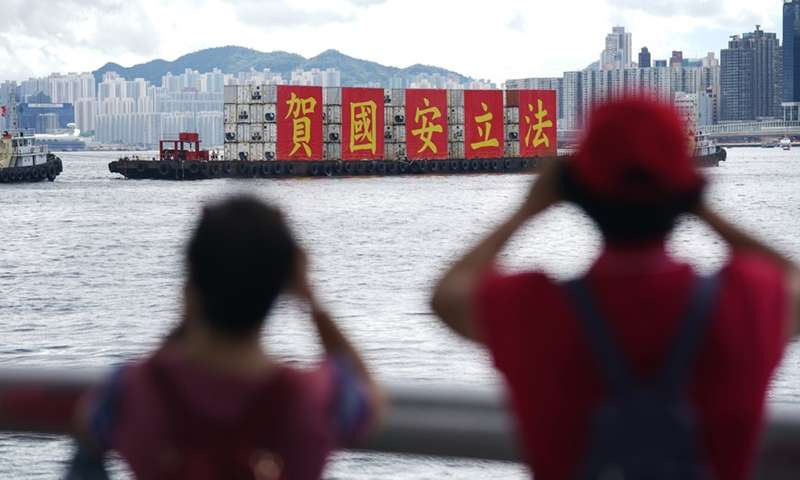HK opposition has no chance to be ‘Trojan Horse’: Global Times editorial
Source: Global Times Published: 2020/7/13 21:18:41

A ship carrying the slogan of "celebrating the passage of the Law of the People's Republic of China on Safeguarding National Security in the Hong Kong Special Administrative Region (HKSAR)" sails at the Victoria Harbor in Hong Kong, south China, July 1, 2020. Photo: Xinhua
Over this past weekend, Hong Kong's pan-democracy camp held primary elections aimed at selecting candidates to run in the Legislative Council elections this September. According to the organizers, over 600,000 Hong Kong residents cast votes by mobile app or paper ballots.The actual number is probably not this high. The public opinion of the Hong Kong opposition and the West has both hyped this figure as a way to express their dissatisfaction with the national security law for Hong Kong.
Such primary elections are not in line with the Basic Law. The move violated relevant legislations on Hong Kong elections. US primaries are carried out within the party, but the primaries of the Hong Kong opposition are taken to the street, which is social and political mobilization that disturbs elections. The election process in each country has its rules, and the primaries of the Hong Kong opposition have no legal basis.
People like Benny Tai Yiu-ting, who were active in this "primary," are radical forces that constantly destroy the stability of Hong Kong. Tai has US support and is one of the typical leading instigators in Hong Kong. He and people like him are dedicated to deceiving the public to topple the Hong Kong government, with the ultimate goal of overturning the political order in Hong Kong.
The national security law for Hong Kong has been carried out with an aim of bringing the city back to stability. Different forces in Hong Kong should conform to this goal. Even extreme opposition forces should make adjustments to it. If anyone plans to confront the law in a roundabout way and continues to destabilize the city, he or she will definitely have no political future there.
The Basic Law and local Hong Kong legislation stipulate the mechanism for democratic elections in Hong Kong. And now the new national security law for Hong Kong will support and protect such a mechanism. At present, Hong Kong's opposition forces are standing at a crossroads of either choosing to promote the implementation of the "one country, two systems" by bringing their influence into play and participate properly in politics; or adopting new extreme methods of confrontation and undermining Hong Kong's political stability.
Some opposition parties claim that if pan-democracy candidates could achieve a 35-plus majority in the 70-seat legislature polls in September, they would be able to block the Hong Kong Special Administrative Region (SAR) government's proposals - hence paralyzing the government's normal function. It is dangerous to make such a political declaration.
Hong Kong's political system is executive-led. It does not run with a separation of powers. The chief executive is not only the head of the SAR government, but also the head of the SAR. This is an institutional arrangement made by the Basic Law to prevent the SAR from falling into constitutional chaos. It also ensures the normal functioning of Hong Kong society.
Therefore, no matter how they are carried out, moves that seek to paralyze the operation of the SAR government and confront the central government are doomed to fail. Such acts cannot break the constraints of the Basic Law and the Constitution. They will inevitably be crushed. The Hong Kong opposition should discard the illusion that they could mess up Hong Kong and force the central government to make decisive concessions. The country won't allow them to be the "Trojan Horse" in Hong Kong.
Despite pressure from the US and the West, the national security law for Hong Kong has been smoothly passed and implemented. It's even more difficult for Hong Kong's oppositional elements to gain effective support from such external forces like the US in the future. The only right way for them is to take a realistic attitude, and act as a constructive force for the wellbeing of Hong Kong society within the framework of the Basic Law.
Therefore, although they held illegal primary elections, the pan-democrats should not make new misjudgments. They should not think that they have found a new way to undermine the authority of the national security law. They need to review the situation and fundamentally adjust their mind-sets. They should abandon influence of Washington and the West and make their own contributions to restore the political stability and continue the prosperity of Hong Kong.
Posted in: EDITORIAL